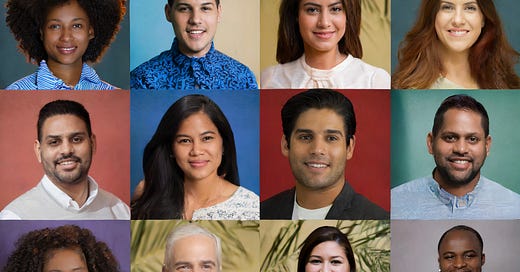Clearview AI: The End of Privacy is Here
Facial recognition technology has arrived. Here's what it means.
This is normally a topic I would highlight as one of my Thursday “Quick Hits” posts, but it’s important enough that I wanted to look more closely at it as a standalone article. There’s a new book out by the journalist Kashmir Hill called Your Face Belongs to Us: A Secretive Startup’s Quest to End Privacy as We Know It.
It’s not a religious book or an end-times book, but it’s one I believe this community may find interesting. (In fact, I mentioned Clearview AI in a Quick Hits article back in April of 2022.) Already a bestseller, Hill’s book is about an artificial intelligence company called Clearview AI that began collecting images of human faces from the internet—without anyone’s permission—and storing them in a database used by machine learning. Quietly, the company trained artificial intelligence on those faces, and now says its AI software can identify anyone, with 99 percent accuracy, based on a snapshot of their facial features.
The company is already working with law enforcement and Homeland Security to help these agencies identify people. Here’s what the book description says:
The app could supposedly scan a face and, in just seconds, surface every detail of a person’s online life: their name, social media profiles, friends and family members, home address, and photos that they might not have even known existed. If it was everything it claimed to be, it would be the ultimate surveillance tool, and it would open the door to everything from stalking to totalitarian state control. Could it be true?
Hill, a tech reporter for the New York Times, looked into the claims and, incredibly, they turn out to be true. Here’s what she wrote in the book’s introduction:
My source had unearthed a legal memo marked “Privileged & Confidential” in which a lawyer for Clearview had said that the company had scraped billions of photos from the public web, including social media sites such as Facebook, Instagram and LinkedIn, to create a revolutionary app. Give Clearview a photo of a random person on the street, and it would spit back all the places on the internet where it had spotted their face, potentially revealing not just their name but other personal details about their life. The company was selling this superpower to police departments around the country but trying to keep its existence a secret.
Clearview AI now has 30 billion faces in their database, likely including yours and mine. And these aren’t just images from your Facebook profile, but faces from the backgrounds of photos. If someone snaps a selfie at church or in a crowded concert and you’re deep in the background, your face could still end up in the Clearview database.
Keep reading with a 7-day free trial
Subscribe to Tipping Point Prophecy Update to keep reading this post and get 7 days of free access to the full post archives.



